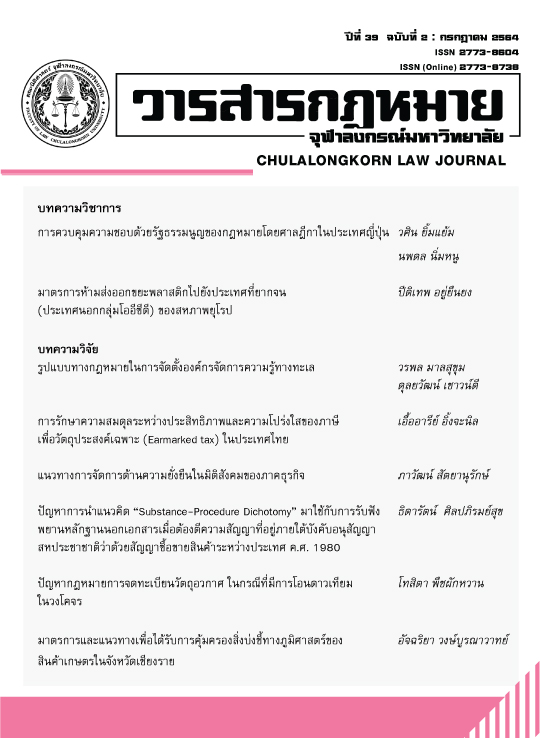รูปแบบทางกฎหมายในการจัดตั้งองค์กรจัดการความรู้ทางทะเล
Main Article Content
บทคัดย่อ
บทความนี้เสนอระเบียบวิธีและผลการศึกษาวิจัยรูปแบบทางกฎหมายในการจัดตั้งองค์กรจัดการความรู้
ทางทะเลในประเทศไทย เนื่องจากองค์กรของรัฐแต่ละรูปแบบมีสถานะและโครงสร้างทางกฎหมายที่แตกต่างกัน
จึงจำเป็นต้องพิจารณาเลือกรูปแบบองค์กรที่สอดคล้องกับภารกิจและบริบทการจัดการความรู้ทางทะเลของ
ประเทศไทย ซึ่งเป็นส่วนหนึ่งของการจัดทำบริการสาธารณะให้เกิดประสิทธิภาพสูงสุด ทั้งนี้ องค์ประกอบสำคัญ
ที่จะนำไปสู่ผลการศึกษา ได้แก่ การวิเคราะห์วัตถุประสงค์ ลักษณะและอำนาจหน้าที่ขององค์กรจัดการความรู้
ทางทะเลที่ประเทศไทยพึงมี ผ่านการศึกษาแนวคิดและความจำเป็นในการจัดตั้งองค์กรจัดการความรู้ทางทะเล
ในบริบทสากลและในประเทศไทย และความเป็นมาและอุปสรรคที่ผ่านมาในการจัดตั้งองค์กรจัดการความรู้
ทางทะเลในประเทศไทย การศึกษาโครงสร้างและลักษณะทางกฎหมายที่ดีขององค์กรจัดการความรู้ทางทะเลจากตัวอย่างในต่างประเทศ การศึกษารูปแบบทางกฎหมายที่เป็นไปได้ในการจัดตั้งองค์กรจัดการความรู้ใน
ระบบกฎหมายไทย ทั้งหลักการและลักษณะพื้นฐานของรูปแบบองค์กรเหล่านั้น พร้อมตัวอย่างองค์กรจัดการ
ความรู้ในด้านอื่นที่จัดตั้งขึ้นแล้ว ตลอดจนความเห็นเกี่ยวกับสภาพความเป็นจริงในทางปฏิบัติจากผู้เชี่ยวชาญ
และทรงคุณวุฒิ
ผลการศึกษาพบว่าการจัดตั้งองค์กรจัดการความรู้ทางทะเลในประเทศไทยในระยะเริ่มแรกพึงเป็นองค์กร
ที่เน้นภารกิจในการจัดการความรู้มากกว่าการสร้างความรู้ด้วยตนเองทั้งหมด โดยทำหน้าที่เป็นผู้ประสานงาน
รวบรวม และบูรณาการองค์ความรู้จากหน่วยงานต่างๆเพื่อสนับสนุนเหตุผลทางวิชาการที่จำเป็นต่อการ
ตัดสินใจทางนโยบายของหน่วยงานภาคปฏิบัติต่างๆซึ่งรูปแบบทางกฎหมายที่สอดคล้องกับภารกิจเช่นว่านี้
ได้แก่ มูลนิธิ หรือ สถาบันภายใต้มหาวิทยาลัยในกำกับดูแลของรัฐ ส่วนในอนาคตพึงยกระดับสู่การเป็นองค์กร
ที่มีอำนาจหน้าที่ในการดำเนินภารกิจต่างๆเพื่อการจัดการความรู้อย่างครบวงจร ซึ่งรูปแบบทางกฎหมายที่
สอดคล้องกับการดำเนินงานดังกล่าว ได้แก่ องค์การมหาชน
Article Details
ลิขสิทธิ์และเนื้อหาในเว็บไซต์ของวารสารกฎหมาย (รวมถึง โดยไม่จำกัดเฉพาะ เนื้อหา รหัสคอมพิวเตอร์ งานศิลป์ ภาพถ่าย รูปภาพ ดนตรีกรรม โสตทัศนวัสดุ) เป็นกรรมสิทธิ์ของวารสารกฎหมาย และผู้ได้รับการโอนสิทธิทุกราย
1. วารสารกฎหมาย ให้อนุญาตให้คุณใช้สิทธิอันไม่เฉพาะเจาะจงที่สามารถถูกถอนเมื่อใดก็ได้ โดยไม่มีค่าใช้จ่าย ในการ
- เยี่ยมชมเว็บไซต์และเอกสารในเว็บไซต์นี้ จากคอมพิวเตอร์หรือเครื่องมือสื่อสารผ่านเว็บบราวเซอร์
- คัดลอกและจัดเก็บเว็บไซต์และเอกสารในเว็บไซต์นี้บนลงคอมพิวเตอร์ของคุณผ่านระบบความจำ cache
- สั่งพิมพ์เอกสารจากเว็บไซต์นี้สำหรับการใช้ส่วนตัวของคุณ
- ผลงานที่ได้รับการตีพิมพ์โดยวารสารกฎหมาย จุฬาลงกรณ์มหาวิทยาลัย ถูกคุ้มครองภายใต้ Creative Commons Attribution 4.0 International License ซึ่งอนุญาตให้ทุกคนสามารถคัดลอก แจกจ่าย ดัดแปลง ส่งต่อ ผลงานได้ ก็ต่อเมื่อผลงานและแหล่งข้อมูลได้รับการอ้างอิงอย่างเหมาะสม
2. วารสารกฎหมาย จุฬาลงกรณ์มหาวิทยาลัย สงวนสิทธิ์ไม่อนุญาตให้คุณใช้สิทธิอื่นใดที่เกี่ยวข้องกับเว็บไซต์และเอกสารบนเว็บไซต์นี้ เช่น การคัดลอก ดัดแปลง เปลี่ยนแปลง ส่งต่อ ตีพิมพ์ แจกจ่าย เผยแพร่ จัดแสดงในที่สาธารณะ ไม่ว่าจะในรูปแบบใดก็ตาม ซึ่งเว็บไซต์หรือเอกสารบนเว็บไซต์ โดยไม่อ้างอิงถึงแหล่งข้อมูลหรือโดยไม่ได้รับอนุญาตเป็นลายลักษณ์อักษรจากวารสารกฎหมาย จุฬาลงกรณ์มหาวิทยาลัย
3. คุณอาจขออนุญาตที่จะใช้เอกสารอันมีลิขสิทธิ์บนเว็บไซต์นี้โดยการเขียนอีเมลล์มายัง journal@law.chula.ac.th
4. วารสารกฎหมาย จุฬาลงกรณ์มหาวิทยาลัย เข้มงวดกับการคุ้มครองลิขสิทธิ์อย่างมาก หากวารสารกฎหมาย จุฬาลงกรณ์มหาวิทยาลัยพบว่าคุณได้ใช้เอกสารอันมีลิขสิทธิ์บนเว็บไซต์นี้โดยไม่ถูกต้องตามการอนุญาตให้ใช้สิทธิ ดังที่กล่าวไปข้างต้น วารสารกฎหมาย จุฬาลงกรณ์มหาวิทยาลัยอาจดำเนินคดีตามกฎหมายต่อคุณได้ เพื่อเรียกร้องค่าเสียหายที่เป็นตัวเงินและคำขอชั่วคราวให้คุณหยุดการใช้เอกสารดังกล่าว ทั้งนี้ คุณอาจถูกสั่งให้ชดใช้ค่าใช้จ่ายใดๆ ที่เกี่ยวข้องกับการดำเนินการตามกฎหมายนี้
หากคุณพบเห็นการใช้เอกสารอันมีลิขสิทธิ์ของวารสารกฎหมาย จุฬาลงกรณ์มหาวิทยาลัย ที่ขัดหรืออาจขัดต่อการอนุญาตให้ใช้สิทธิดังที่ได้กล่าวไปข้างต้น โดยเชื่อว่าได้ละเมิดลิขสิทธิ์ของคุณหรือของผู้อื่น สามารถร้องเรียนมาได้ที่ journal@law.chula.ac.th
เอกสารอ้างอิง
2. Geoffrey Till, Seapower A Guide for the Twenty-First Century, 2nd ed. (UK : Routledge, 2009), pp 23-33.
3. Geoffrey Till, Seapower A Guide for the Twenty-First Century, pp 286-322.
4. สำนักงานสภาความมั่นคงแห่งชาติ, แผนความมั่นคงแห่งชาติทางทะเล พ.ศ.2558-2564, (กรุงเทพมหานคร : สำนักพิมพ์สำนักงานสภาความมั่นคงแห่งชาติ, 2558), หน้า 4.
5. เผดิมศักดิ์ จารยะพันธุ์, “รายงานฉบับสมบูรณ์ โครงการสถานการณ์และข้อเสนอแนะในการบริหารจัดการผลประโยชน์ทางทะเลของประเทศไทยเพื่อความมั่นคง มั่งคั่ง และยั่งยืน,” (กรุงเทพมหานคร : สำนักงานกองทุนสนับสนุนการวิจัย, 2562), หน้า 27.
6. คณะอนุกรรมการจัดการความรู้เพื่อผลประโยชน์แห่งชาติทางทะเล (อจชล.) สำนักงานสภาความมั่นคงแห่งชาติ สำนักนายกรัฐมนตรี, ทะเลและมหาสมุทรและผลประโยชน์ของชาติทางทะเล, หน้า 11-14.
7. นวรัตน์ ไกรพานนท์ กัญติยา สดใส และวรัชยา สุวรรณเนตร, “ช่องว่างทางนโยบายกับการจัดการผลประโยชน์แห่งชาติทางทะเลของประเทศไทย : ความท้าทายการจัดการผลประโยชน์แห่งชาติทางทะเลไทยภายใต้กติกาสากล,” (กรุงเทพมหานคร : สำนักงานกองทุนสนับสนุนการวิจัย, 2555), หน้า 201-231.
8. สำนักงานคณะกรรมการยุทธศาสตร์ชาติ, ยุทธศาสตร์ชาติ พ.ศ. 2561 – 2580, (กรุงเทพมหานคร : สำนักพิมพ์สำนักงานเลขานุการของคณะกรรมการยุทธศาสตร์ชาติ, 2561), หน้า 11-63; สำนักงานคณะกรรมการพัฒนาการเศรษฐกิจและสังคมแห่งชาติ สำนักนายกรัฐมนตรี, แผนพัฒนาเศรษฐกิจและสังคมแห่งชาติ ฉบับที่ 12 พ.ศ. 2560-2564, (29 ธันวาคม 2559), หน้า 63-18
9.ฐานข้อมูลเว็บไซต์ความรู้ทางทะเล (Marine Knowledge Hub), “กฎหมายที่เกี่ยวข้องกับทะเล,” สืบค้นจากhttp://www.mkh.in.th/index.php?option=com_content&view=article&id=48&Itemid=154&lang=th
เข้าถึงเมื่อ 6 มิถุนายน 2563
10. เผดิมศักดิ์ จารยะพันธุ์และคณะ, “รายงานวิจัยฉบับสมบูรณ์ โครงการจัดการความรู้เพื่อผลประโยชน์แห่งชาติทางทะเล,” (กรุงเทพมหานคร : สำนักงานกองทุนสนับสนุนการวิจัย, 2553), หน้า 141-145.
11. สำนักงานสภาความมั่นคงแห่งชาติ, แผนความมั่นคงแห่งชาติทางทะเล พ.ศ. 2558-2564, หน้า 64.
12. ประกาศสำนักนายกรัฐมนตรี “เรื่อง การประกาศแผนการปฏิรูปประเทศ,” หน้า 202-206.
13. ฐานข้อมูลเว็บไซต์ RSiS Nanyang Technological University Singapore, “About the Institute of Defence and Strategic Studies,” สืบค้นจาก https://www.rsis.edu.sg/research/idss/about-the-centre/about-the-institute-of-defence-and-strategic-studies-idss/#.X8H9l7MxXws เข้าถึงเมื่อ 28 พฤศจิกายน 2563
14. ฐานข้อมูลเว็บไซต์ University of Wollongong Australia, “About,” สืบค้นจาก https://www.uow.edu.au/ancors/about/ เข้าถึงเมื่อ 28 ตุลาคม 2563
15. รวบรวมข้อมูลจากเว็บไซต์ Korea Maritime Institute สืบค้นจาก https://www.kmi.re.kr/eng/contents/contentsView.do?rbsIdx=215 เข้าถึงเมื่อ 28 พฤศจิกายน 2563
16. รวบรวมข้อมูลจากเว็บไซต์ Korea Institute of Ocean Science & Technology สืบค้นจาก https://www.kiost.ac.kr/eng/sub01_01.do เข้าถึงเมื่อ 28 พฤศจิกายน 2563
17. ฐานข้อมูลเว็บไซต์ The Ocean Policy Research Institute, “About OPRI,” สืบค้นจาก https://www.spf.org/en/opri/profile/ เข้าถึงเมื่อ 3 พฤศจิกายน 2563
18. ฐานข้อมูลเว็บไซต์ MIMA Martine Institute of Malaysia, “MIMA Overview,” สืบค้นจาก https://www.mima.gov.my/about-us/about-mima/mima-overview เข้าถึงเมื่อ 10 พฤศจิกายน 2563
19. ฐานข้อมูลเว็บไซต์ National Maritime Foundation, “The Foundation Genesis,” สืบค้นจาก https://maritimeindia.org/the-foundation/#toggle-id-1 เข้าถึงเมื่อ 10 พฤศจิกายน 2563
20. ชาญชัย แสวงศักดิ์, องค์การมหาชน, (กรุงเทพมหานคร : สำนักพิมพ์นิติธรรม, 2542), หน้า 99-110.
21. ชาญชัย แสวงศักดิ์, คำอธิบายกฎหมายปกครอง, พิมพ์ครั้งที่ 28 (กรุงเทพมหานคร : สำนักพิมพ์วิญญูชน, 2562), หน้า 205-206.
22. ประยูร กาญจนดุล, คำบรรยายกฎหมายปกครอง, พิมพ์ครั้งที่ 5 (กรุงเทพมหานคร : คณะนิติศาสตร์ จุฬาลงกรณ์มหาวิทยาลัย, 2549), หน้า 120-121.
23. ชาญชัย แสวงศักดิ์, องค์การมหาชน, หน้า 99-110.
24. ชาญชัย แสวงศักดิ์, คำอธิบายกฎหมายปกครอง, หน้า 218.
25. สมยศ เชื้อไทย, หลักกฎหมายมหาชนเบื้องต้น, พิมพ์ครั้งที่ 14 (กรุงเทพมหานคร : สำนักพิมพ์วิญญูชน, 2563), หน้า 160-161.
26. กรมการปกครอง กระทรวงมหาดไทย, คู่มือการดำเนินงานมูลนิธิและสมาคม, หน้า 17.


